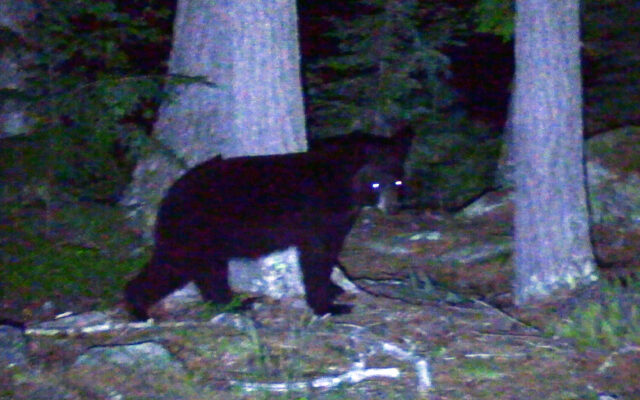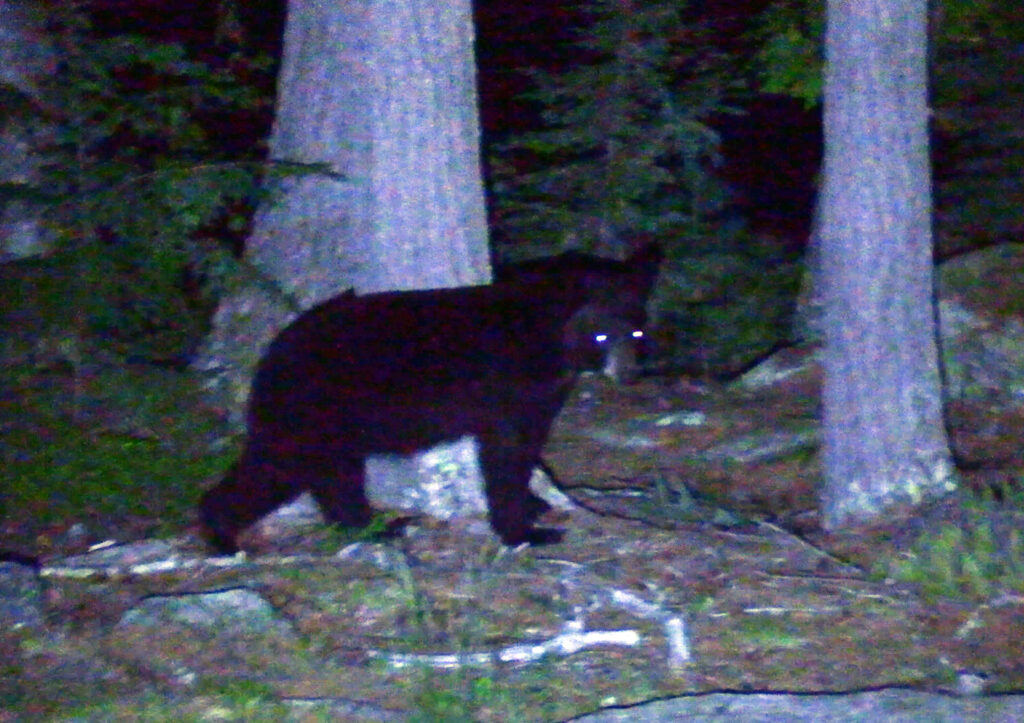
How I avoid bears at my backyard bird feeders
By Bob Duchesne
It was just about 3 a.m. when I heard the crash of a bird feeder hitting the ground in my backyard. I knew right away what it was — bears.
I ran to the door and turned on the porch light. A large sow and two sizable cubs looked up at me with alarm. They bolted to the nearest tree. The cubs climbed high, out of sight. Mom stayed low, sizing me up.
The irony is that I took in all my feeders last spring, just before bears would emerge from hibernation. Bear visits to my yard are now routine early in the season. Historically, they stop marauding as the year goes on, probably daunted by the increase in human activity during summer.

BEAR SIGHTING — A black bear in the backyard.
So, I waited until mid-July to put out a test feeder. Apparently, these bears didn’t get the memo — they knocked it over just two days later.
I’m not thoroughly stupid, although opinions differ on that. For my test, I had put out three feeders.
One was a hanging platform feeder with sunflower seeds. There is nothing for a bear to dismantle or damage, should one decide to drag it off its pole. A second was a suet feeder already patched together with wires from when a bear tore it apart two years ago. The last, and victim in this current raid — was just a cheap sunflower seed basket that would not be mourned if destroyed.
In short, my big worry was not the destruction of the feeders. My concern was destruction by the bears. I did not wish to encourage bad behavior by abetting their crimes.
Last year, I also took in the feeders at the end of winter. A young sow visited nonetheless and cleaned up a pile of fallen seed where the feeder had been. I sat with her for a while one spring evening. We chatted a bit. She didn’t flinch when I banged pots together, although she did bolt to the nearest tree when I occasionally tossed a pail of water in her direction. However, she assessed that I wasn’t really a threat, and promptly returned to her banquet each time. I gave up and went to bed.
There were likely multiple bears making the rounds of my neighborhood last year, and some of their pillaging got a bit messy. One morning, biologists from the Maine Department of Inland Fisheries and Wildlife canvassed the neighborhood, advising residents on how to avoid bear mischief. I was delighted. In truth, it’s not the bear’s behavior that needs to be managed — it’s people’s behavior.
Several nights later, the biologists returned for a neighborhood meeting. Aside from offering some good common sense, they also provided one great insight. Bears should never be allowed to get relaxed around people. In hindsight, I should have done more to make last year’s bear uncomfortable. Perhaps this was the same animal — a lone bear last year, a worried mother of two this year.
Lesson learned. We got a marine airhorn, and it’s loud enough to peel paint. When this year’s naughty threesome showed up, I was well-armed.
I already owned a powerful flashlight, strong enough to light up the dark side of the moon. With the flashlight in one hand and the horn in the other, I confidently strode into my yard and brought the feeders indoors, where they will remain for the rest of the summer.
Mama bear huffed repeatedly, but never left her perch on the side of the tree. From six feet above ground, she blinked at me in the harsh glare, alternately looking up at her cubs for reassurance that they were out of harm’s way. She relaxed a bit, stopped huffing as I picked the feeder off the ground, and watched me walk away.
Our close encounter was less than 30 seconds, and the horn went unused. Still, I checked to make sure the lid was tight on my compost bin. I inspected the barbecue grill to make sure it was greaseless. We keep household trash in the garage between dump runs, so I checked that door, too and I closed all the screened windows.
Within 15 minutes, I was back in bed and sound asleep. I assume the hungry bear family returned to the ground shortly thereafter. With no food left in my yard, I imagine they circled over to my neighbor’s delicious compost pile. I also imagine that if my behavior was too bold, I’ll get another visit from the biologists.
For any out-of-stater reading this — yes, this is how we Mainers live.